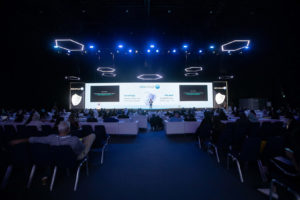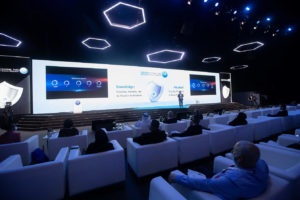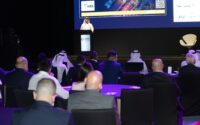Second Day Of Knowledge Summit Tackles Development Of Knowledge Economy, Balance In Times Of Crisis, And Fight Against Global Poverty
The Knowledge Summit being organized by the Mohammed Bin Rashid Al Maktoum Knowledge Foundation (MBRF) in collaboration with United Nations Development Programme (UNDP)concluded a successful second day after a comprehensive discussion on key topics close to the engagement activities of MBRF and UNDP. These include the Future of Knowledge Foresight Report, the evolution of knowledge into wisdom, the importance of balance in mental health during crisis, and the fight against global poverty.
UNDP & MBRF: A Partnership for Sustainable Development
The first session saw the participation of H.E. Jamal Bin Huwaireb, CEO of MBRF; Khaled Abdel Shafi, Director, Regional Hub for Arab States, UNDP and Dr. Hany Torky, Chief Technical Advisor, Knowledge Project, UNDP.
The discussion focused on the unique strategic partnership between MBRF and UNDP through the Knowledge Project, which aims to empower and promote knowledge in societies that will help them achieve the Sustainable Development Goals. The two entities work as well together on various important initiatives and have successfully implemented global projects under this partnership, particularly the Global Knowledge Index and the Future of Knowledge Foresight Report.
H.E. Jamal Bin Huwaireb emphasized:“The Future of Knowledge Foresight Report is a product of the long-standing partnership between the Foundation and UNDP under the Knowledge Project initiative which was established with a shared vision to empower and promote knowledge in societies in order to achieve the UN Sustainable Development Goals.”
Evolving Knowledge into Wisdom
The second session themed, ‘Evolving knowledge into wisdom’ was presented by John Sanei, a future trends specialist and member of Singularity University. He described the changes facing humanity, how knowledge and wisdom continue to evolve as people deal with changes, and how the right decision and strategic action can be applied to face an unknown future.
Sanei emphasized that knowledge is the most important power to deal with the future, as it influences the planning and employment of human capital for sustainable development. He said: “Unless we reconsider our development strategies, we will not achieve the desired change, as no one in the world can tell us what the future will be like.”
Sanei explained that the knowledge revolution relies on making use of technological developments to evolve into the future, adding that societies without knowledge could not solve any problem they face. He further mentioned that there are two types of people: one who contributes to shaping the future, and the other just takes the spectator’s position and watch what is happening.
Growing the Knowledge Economy in an Age of Intangibles
The third session themed ‘Growing the Knowledge Economy in an Age of Intangibles’ features several topics such as knowledge economy, digital transformation, and economic growth. It also explored the future of innovation, intellectual capital, and investment in research, development, and innovation.
The speakers who led the session were Dr. Shahid Yusuf, Chief Economist of Growth Dialogue; Jan Sturesson, Founder of RESTING Advice from the Future; and Calhoun Reb Thomas, Patent Attorney and Publisher of Knowledge Economy website.
The session concluded that the foundations of the knowledge economy rest on four main pillars: innovation, research and development, technology, and education. People must build their future through education and invest in research and development to adopt technology and thereby serve people and achieve the future.
Psychological Balance in Times of CrisisMental Health Consultant Dr. Ahmed Emara, who is also a motivational speaker and psychologist discussed during the fourth session which was themed ‘PsychologicalBalance in Times of Crisis’ how crises can be dealt with and consider it as a significant part of change. He also discussed the importance of balance for the mind.
Emara told the audience that each one has a different way of dealing with a crisis and that depends on the type of crisis as well and the degree of its impact on the individual’s life. The individual needs to be aware the proper way to deal with a crisis and find solutions, he added, saying that it is important to learn from the past and from the crises of others to avoid doing the same mistakes.
Emarafurther explained that having some balance in one’s mental state can help individuals cope with and overcome crises, and deal with fear, anxiety, and depression. He said that it is important to achieve stability and calmness, as well as develop the capacity to overcome the crisis, particularly in the recent aftermath of the Covid-19 pandemic which had a significant impact on mental health.
Creative Thinking: Working Towards PovertyFree Societies
The fifth session featured the value of creative thinking in the global fight against poverty. The panelists include Dr. Sonia Ben Jaafar, CEO of Abdulla Al Ghurair Foundation for Education Forum; Nada Al Hajjri, Acting Director of Programs, Dubai Cares; and Corinne Mitchell, Director of Programmes and Operations, Oxford Poverty and Human Development Initiative, University of Oxford.
The speakers agreed on the importance of education in achieving sustainable development and that priority should be given to educational issues before addressing economic challenges particularly in the light of the Covid-19 pandemic and its significant impact on the educational system in low-income countries. They also concurred that cooperation between various actors plays a strong role in effectively responding to the challenges of education for those who cannot afford them, including refugees who are greatly impacted with lack of access to normal education.
Global Social Epidemiological Resilience (SER)
During the sixth session, Michael Green, TED speaker, economist, and social Progress expert, presented the Social Progress Index which is being published annually by Social Progress Imperative. It measures the level of social progress in countries based on several criteria for measuring well-being, opportunities and basic human needs. It is the most comprehensive measure of social and environmental performance.
Green spoke of countries’ capability to meet basic human needs and enhance the quality of their lives, make use of lessons learnt from the Covid-19 pandemic, and build on them for the future. He noted that cooperation is necessary to provide the ideal health environment to address and eliminate the risks challenging people.
How Coronavirus is Reshaping the Legal Landscape
A penel discussion on ‘How Coronavirus is Reshaping the Legal Landscape’was the last session held on the second day led by Dr. Habib Al Mulla, Executive Chairman of Habib Al Mulla and Partners and Amna Al Owais, Chief Registrar at DIFC Courts. The talk was moderated by Dr. Ludmila Yamalova, Founder and Managing Partner, HPL Yamalova and Plewka.
The session tackled the main challenges faced by the legal sector during the Covid-19 pandemic. The speakers shared how digital transformation in Dubai has contributed to the sector’s preparedness to deal with the pandemic.
Dubai was prepared and has invested the necessary technology to deal with the conditions posed by the pandemic, considering that it’s the emirate’s digital transformation journey to establish a digital government has started in 2017. In December 2021, the emirate has fully digitalized and abandoned the use of paper once and for all.
The speakers futher elaborated on how the pandemic has redefined the concept of trials at the global level and changed its traditional systems after becoming fully digital during the pandemic. It has enabled the legal sector in the emirate to keep pace with the digital transformation.
The further discussed how the ongoing global digital transformation could change the system and mindset on legal work in the emirate as activities such as meeting clients and holding trials remotely from anywhere and at any time through video hearings, and access to virtual courtrooms are now being done.
The Knowledge Summit continues from March 16 to 18 through virtual sessions with the participation of experts, leaders, and government officials from all over the world.








